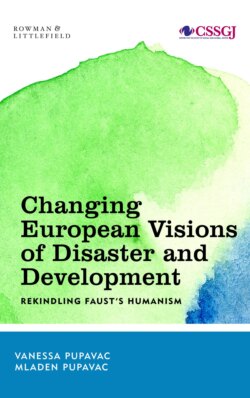Читать книгу Changing European Visions of Disaster and Development - Vanessa Pupavac - Страница 9
На сайте Литреса книга снята с продажи.
Acknowledgements
ОглавлениеThe original idea for the book came from reading some lines of Sigmund Freud, describing the Dutch construction of the Zuyder Zee dam project completed in 1932 as a work of culture (Freud 1973 [1933]: 112). This took us to thinking about the hydro-electric engineering of Tesla, celebrated in his region of birth where Mladen was also born, and the construction of the Thames Barrier where one of Vanessa’s uncles worked as an engineer.
We submitted the manuscript to the publishers at the end of January 2020, coinciding with the 67th anniversary of the 1953 North Sea floods, at a time when communities were being hit by serious flooding in the UK and elsewhere in Europe, and the day after the World Health Organisation announced that Covid-19 represented a global public health emergency.
We thank the series editors Tony Burns and Ben Holland at the Centre for the Study of Social and Global Justice, and Rebecca Annastasi colleagues at Rowan & Littlefield, Dhara Snoweden, Sathya Shree and their for their support of the book. Our research was facilitated by a grant from the Economic and Social Research Council and working on ‘A Shared Space and a Space for Sharing: A Transdisciplinary Exploration of Online Trust and Empathy’, led by Peter Bath with Julie Brownlie, Dave Boothroyd, Heather Draper, Nishanth Sastry, and others. We further thank Denis Abdić, Sabine Beppler, Andreas Bieler, Nenad Bobić, David Chandler, Rory Cormac, Ruth Davidson, Andrew Denham, Oliver Dodds, Paul Drury, Cees van der Eijk, Nicky Bean, Paul Eliot, Frank Furedi, Pauline Hadaway, Jo Herlihy, Dennis Hayes, Catherine Gegout, Mathew Humphrey, Gulshan Khan, Chun-Yi Lee, Jan Meyer-Sahling, Caitlin Milazzo, Ian Pegg, Chris Pierson, Denis Radić, Ljubo Radić, John Raglett, Wyn Rees, Julian Reid, Matthew Rendall, Bettina Renz, Stefano Saccomani, Lucy Sargisson, Alex Serafimov, Jens Sorenson, Eddie Tembo, Annemarie Walter, and Kevin Yuill.
We are also grateful for the invitations to speak and the feedback we received at the universities of Birmingham, Derby, Gothenburg, Liverpool, Manchester, Newcastle, Northumbria, Sheffield, Westminster, and the Swedish Institute of International Affairs as well as the Centre for the Study of Social and Global Justice at the University of Nottingham, and various city salons, conferences, or festivals, including at the Brunswick Inn in Derby, and the Barbican and the Wellcome Trust in London. We are indebted to long discussions with Mark Duffield and Jean Duffield. We also thank the anonymous reviewers for their helpful recommendations.
The book acknowledges extensive use of the following translations and other works:
Goethe, Johann Wolfgang (1949 [1808]) Faust, Part I. Translated and introduced by Philip Wayne. Harmondsworth: Penguin.
Goethe, Johann Wolfgang (1998 [1832]) Faust, Part II. Translated and introduced by David Luke. Oxford: Oxford University Press.
Goethe, Johann Wolfgang (2009 [1832]) Faust, Part II. Translated and introduced by David Constantine. London: Penguin.
The book contains excerpts from the following publications:
Pupavac, Vanessa (2008) ‘A Critical Review of the NGO Sustainable Development Philosophy’, in Zheng Yongnian and Joseph Fewsmith (eds) China’s Opening Society: The Non-state Sector and Governance. London: Routledge, pp. 15–35.
Pupavac, Vanessa (2010a) ‘The Consumerism-Development-Security Nexus’. Security Dialogue, Vol. 41(6), pp. 691–713.
Pupavac, Vanessa (2010b) ‘From Materialism to Non-materialism in International Development: Revisiting Rostow’s Stages of Growth and Schumacher’s Small Is Beautiful’, in Jens Sorensen (ed.) Challenging the Aid Paradigm: Western Currents and Asian Alternatives. Basingstoke: Palgrave, pp. 47–77.
Vanessa Pupavac (2014) ‘Natural Disasters: Trauma, Political Contestation and Potential to Precipitate Social Change’, in Erica Resende and Dovile Budryte (eds) Memory Trauma in International Relations: Theories, Cases and Debates. London: Routledge, pp. 74–91.
This book would have been impossible without study leave from the School of Politics and International Relations at the University of Nottingham and support from Tony Simmonds and his fellow librarians and IT colleagues.
Finally we thank Jelena and Carl, who visited Nikola Tesla’s home village of Smiljan with us, and most of the Croatian towns, villages, and mountains mentioned in this book.
